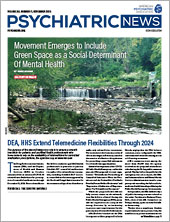A patient who had an appointment at her obstetrician-gynecology (OB-GYN) practice was struggling. A Marine spouse in her early 20s, she did not have a support system at home. While at her OB-GYN, she was able to speak with a licensed clinical social worker with the North Carolina Statewide Telepsychiatry Program (NC-STeP) virtually. On that call, the patient admitted what she hadn’t told her OB-GYN: She had thoughts of suicide, had a history of self-harm, and had written a suicide note the week before.
The social worker immediately contacted staff at the OB-GYN’s office, who reached out to a mobile crisis unit, which helped secure the patient a bed at a mental health facility. Ryan Baker, M.H.A., NC-STeP’s administrator, said that the patient is now doing well. “These are the success stories that policymakers, politicians, and the public need to hear,” he said.
NC-STeP Founder and Director Sy Saeed, M.D., M.S., started the program in 2013 because North Carolina was experiencing a problem also faced by many other states: Patients were spending huge amounts of time in the emergency department (ED) because they had nowhere else to go and no psychiatrists to see them. NC-STeP connects patients in EDs across the state with psychiatrists and other behavioral health workers virtually.
Saeed is a professor and chair emeritus of the Department of Psychiatry and Behavioral Medicine and founding director of the Center for Telepsychiatry and e-Behavioral Health at the Brody School of Medicine at East Carolina University. He is also a member of APA’s Committee on Telepsychiatry.
Before NC-STeP started, the average length of stay for psychiatric patients in the ED in North Carolina was 72 hours. Within the program’s first year, that length of stay was cut in half, and the program has maintained that reduction since, Saeed said. It has also expanded outside the ED, most recently to provide care to kids.
Expanding to Address Needs of Special Populations
One of NC-STeP’s goals is to ensure all patients have access to evidence-based mental health services, Saeed said. In 2018, it expanded into community-based health care settings for patients in crisis. In 2021, it launched a collaborative care model with OB-GYN offices, connecting nurses, diabetes educators, behavioral health managers, nutritionists, obstetricians, maternal fetal medicine specialists, and psychiatrists together to care for patients. This grant-funded project also screened patients for food insecurity and offered a medically tailored food bag, nutrition education handouts, and links to existing community resources for emergency food to those who screened positive for food insecurity.
This year, NC-STeP received a three-year, $3.2 million grant from the United Health Foundation to expand into six pediatric and primary care clinics to provide services to youth. The goal is to collaborate with pediatricians and provide psychiatric expertise, as well as to address stigma around receiving mental health care, Saeed said.
The grant will also fund the development of a virtual reality game through which children and their families can learn about mental health and receive peer-to-peer support. The game will include a 3-D community house on the Roblox platform called “NC Kids Get Well.”
Earlier this year, East Carolina University’s Center for Telepsychiatry and e-Behavioral Health held a competition for children and adolescents aged 5 to 18 in which they could submit their own designs for the community house. “It warmed our hearts to see their entries,” Saeed said.
A Model for Other States
Several states have reached out to NC-STeP, seeking guidance on building similar programs, including Vermont. The Vermont Emergency Telepsychiatry Network (VETN) launched in October of 2022 after Saeed gave a presentation to a group focused on telehealth. Ali Johnson, M.B.A., VETN’s project lead, said the goal is to help Vermont EDs provide timely psychiatric care via telehealth for people with mental health needs.
Because Vermont is such a small state, the program looks different from NC-STeP, Ali explained. Several hospitals in Vermont already provide telepsychiatry services, while others have none. VETN has an advisory board of experts who regularly meet to understand the state’s needs, demonstration projects currently underway in two EDs, and a training program in development that will disseminate telepsychiatry best practices. While VETN isn’t statutorily required to collect data like NC-STeP, Johnson said VETN has still implemented an evaluation component to ensure it also has robust data.
VETN is an example of how similar approaches can be adjusted to meet the needs of different states. Ultimately, regardless of the state, the goal has remained the same: Ensure all patients in crisis have access to quality psychiatric care. “Someone living in rural North Carolina should have the same access to care as someone in a suburban or urban area,” Baker said. “This program actually fulfills that goal.”
Program Often Overturns Involuntary Hospitalizations
As of June 2023, NC-STeP had provided 59,216 telepsychiatry consultations and saved the state more than $54 million. Further, over 32% of the patients it has served did not have insurance.
A significant factor in NC-STeP’s cost-savings estimate is the involuntary hospitalizations that were overturned after patients were evaluated by an NC-STeP psychiatrist or behavioral health worker. Since the program began, it has resulted in over 8,500 involuntary hospitalizations being prevented.
“In the very first year of the program, we saved the sheriff’s department approximately $500,000 just by cutting down on their transportation costs,” Saeed said.
Because a substantial part of NC-STeP’s funding comes from the state, Saeed regularly provides updates to the legislature on the program’s value. It’s easy and straightforward to explain the benefit to North Carolina residents in terms of dollar amounts, but Saeed also emphasized what is saved on behalf of the patients: Time away from their homes and involuntary transportation to an unfamiliar treatment center.
“We are able to provide high-quality, evidence-based care to patients closer to their home and, at the same time, cut down on costs in a lot of different ways,” he said. “We help in delivering what science has promised: access to effective care.” ■
